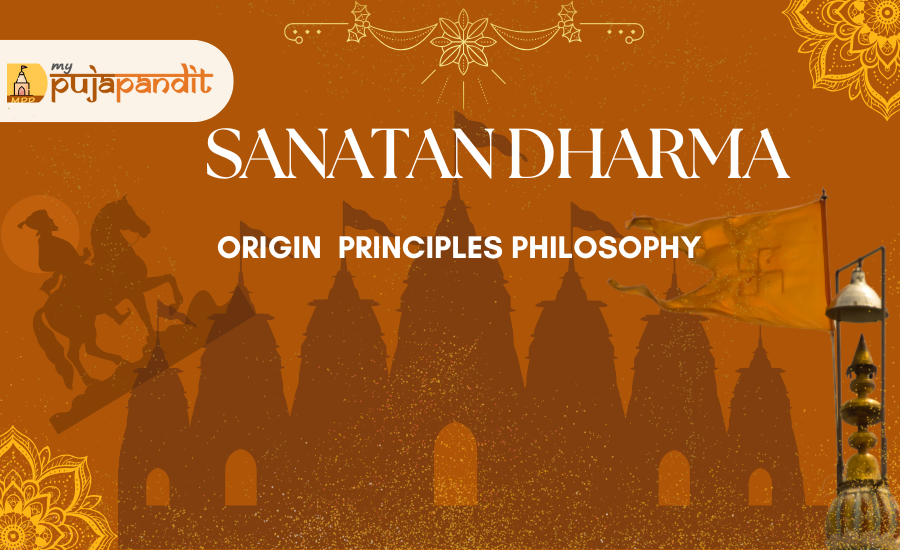
Sanatan Dharma: Origin, Principles, Philosophy.
In a world of constant change, the ancient spiritual way of Sanatan Dharma is a timeless pillar of truth, harmony, and inner realization. Often equated with Hinduism, Sanatan Dharma goes beyond religious boundaries. It is a way of life — one that imparts living in harmony with nature, developing compassion, and seeking the ultimate truth. It is at its very essence spiritual, leading the seeker on a path of self-discovery, inner peace, and union with the divine. Instead of imposing dogma, it invites seekers to experience the holy through introspection, meditation, and conscious living.
What Is Sanatan Dharma?
Sanatan Dharma, which translates to "eternal duty" or "eternal law," is the religious basis on which Hindu philosophy stands. In contrast to organized religions that started at a specific date, Sanatan Dharma is described as being Anadi (without beginning) and Anant (without end). It has no bounds by region, language, or tradition — it is universal.
Sanatan Dharma, unlike strict belief systems, encourages people to find truth for themselves. It embraces inquiry, self-reflection, and varied means to the divine.
Sanatan Dharma: Origin and Historical Significance
The beginnings of Sanatan Dharma go back to the Vedas, the oldest scriptures of human civilization. The holy texts — Rigveda, Yajurveda, Samaveda, and Atharvaveda — were not "written" in the modern sense of the word but were "heard" by illumined sages (Rishis) in deep meditation.
There is no specific "founding year" for Sanatan Dharma, since it is said to be an integral part of the cosmic order itself. For millennia, its teachings were transmitted orally, leading generations to righteous living, balance, and liberation (Moksha).
Now, whenever we mention Sanatan Dharma: Origin, Principles, Philosophy, and Its Relevance in the Contemporary Era, we talk about these age-old traditions that survive to this day through yoga, meditation, temple worship, festivals, and ethics infused into Indian society.
Essential Principles of Sanatan Dharma
Sanatan Dharma's beauty is that its fundamental principles — eternal, flexible, and human — underpin not only religious behavior but also everyday life.
Some of the Key Principles Are:
- Satya (Truth): Always live and speak in truth.
- Ahinsa (Non-Violence): Show respect to all forms of life and refrain from hurting them.
- Shauch (Purity): Be clean in body, mind, and environment.
- Daya (Compassion): Be gentle and compassionate to all living things.
- Tapasya (Self-Discipline): Practice self-control of desires and ego.
- Karma (Action): All deeds have repercussions—good or ill.
- Dharma (Duty): Do your duty as per your life role.
These universal principles make Sanatan Dharma more than a religion — they make it an entire way of living.
Philosophy Behind Sanatan Dharma
The Sanatan Dharma philosophy is both profound and rational. It promotes knowing the self, the universe, and the divine on a deeply integrated level.
Major Concepts:
- Brahman: The boundless, formless, and ubiquitous Supreme Consciousness.
- Atma: The soul or the authentic self in each living entity, which is one with Brahman.
- Maya: Illusion of the world of matter which conceals the real nature of existence.
- Moksha: Freedom from the cycle of birth and death (Samsara).
This religious understanding, transmitted through Upanishads, Bhagavad Gita, and other scriptures, is the foundation of Sanatan Dharma: Origin, Principles, Philosophy, and Its Importance in the Modern World.
Sanatan Dharma vs Hinduism: Is There a Difference?
Sanatan Dharma and Hinduism are used interchangeably by many. Yet, there is a fine, yet important, difference.
Hinduism is a recent term that developed as a result of colonial and cultural categorizations.
Sanatan Dharma in reality is the modern-day umbrella under which practices of Sanatan Dharma are adopted. But Sanatan Dharma itself continues to be the soul — eternal, expansive, and spiritual in essence.
Quotes That Inspire Eternal Living
- Truth is one, sages call it by many names.– Rigveda
- Do your duty without attachment to results. – Bhagavad Gita
- The Self is eternal, unborn, and undying. – Katha Upanishad
These poems demonstrate how Sanatan Dharma is timelessness itself, providing counsel that is intensely individual but universally relevant.
Sanatan Dharma in Today's World
As the world faces increased environmental awareness, mental health issues, and a quest for purpose, Sanatan Dharma teachings are more pertinent than ever before.
Why It Matters Today:
- Encourages eco-friendly living: Nature and all creatures respect.
- Promotes mindfulness: Through yoga, meditation, and spiritual reflection.
- Provides emotional stability: With lessons on karma, detachment, and dharma.
- Promotes unity: Teaches that all paths converge to the same truth — Ekam Sat Viprah Bahudha Vadanti.
In short, Sanatan Dharma: Origin, Principles, Philosophy, and Its Importance in the Modern World is a guide to not only spiritual enlightenment but also to living a meaningful, peaceful, and balanced life in the 21st century.
Conclusion: The Timeless Relevance of Sanatan Dharma
Sanatan Dharma goes beyond rituals, scriptures, and temples. It is lived through everyday actions, relationships, thoughts, and intentions. Whether you are drawn to its philosophical complexity or motivated by its ethical straightforwardness, Sanatan Dharma offers something profoundly worthwhile for each human being. In fact, for those seeking to perform traditional pujas or ceremonies in line with Sanatan Dharma, platforms like MyPujaPandit make it easy to book Pandit online, bringing authentic Vedic practices right to your home.

